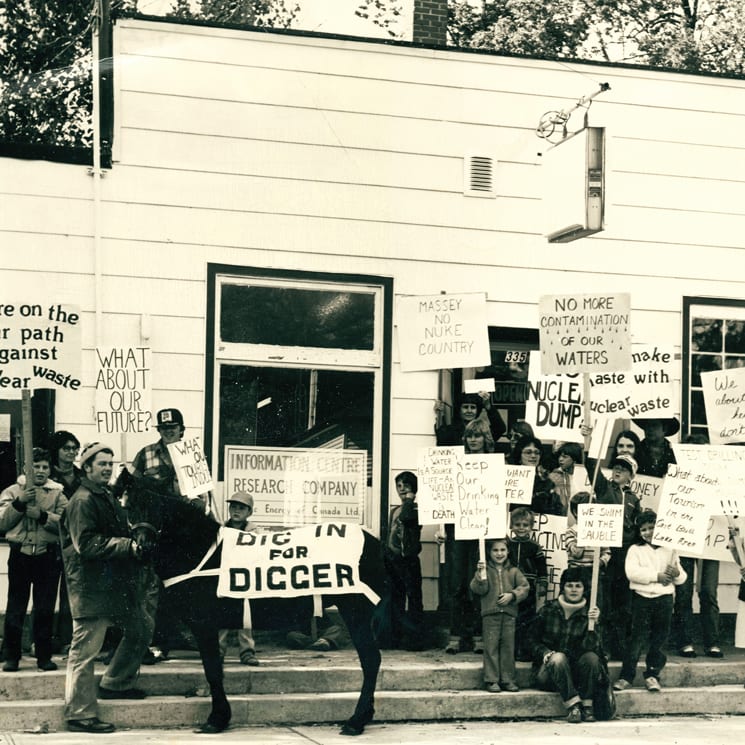Knows No Kindness finds Casper Skulls a long way from the shoegazing rock of previous material, from 2015's "King of Gold" single to 2017 debut LP Mercy Works. That applies to their personnel change in new drummer Aurora Bangarth, as well as their switch to a dreamier, more expansive — yet still grounded — sound.
The album centres around vocalist Melanie St-Pierre's experiences growing up in Sudbury and Massey, ON, before moving to Toronto. In turn, the experiences range from the soaring to the heartbreaking. The album largely matches the simultaneously icy and inviting atmosphere of a typical northern Ontario community, and many of its tracks evoke a long history, such as "The Mouth," written about a park St-Pierre went to often as a child.
This is most evident on standout track "Witness," a song based on St-Pierre's experiences testifying after witnessing the murder of her best friend's father. It's chock-full of strong storytelling details, anchored by a steady pacing and unobtrusive guitar, but it's the last thirty-odd seconds of St-Pierre asking with a plaintive bitterness, "What have you done?" that best conveys the emotional impact of the traumatic tale.
The band's soft-heavy approach to lyrics and musicality invites comparisons to '90s icons Mazzy Star, in that many of the tracks feel anthemic without becoming overpowering or staid. Others, like "Rose of Jericho," take the folk-rock approach to pondering love in an ever-changing world — fitting for a song named after a resurrection plant.
The album title and self-same track refer to American Modernist painter Georgia O'Keeffe, who was also a frequent collector of bones in the New Mexico desert. Once, she wrote, "The bones seem to cut sharply to the center of something that is keenly alive on the desert even though it is vast and empty and untouchable – and knows no kindness with all its beauty." That titular track focuses on St-Pierre's fear of death, as borne from her childhood experiences. But as a whole, Casper Skulls' latest batch of tracks all balance on a similar knife's edge — finding the tender and beautiful in the trauma of one's formative times.
(Next Door)The album centres around vocalist Melanie St-Pierre's experiences growing up in Sudbury and Massey, ON, before moving to Toronto. In turn, the experiences range from the soaring to the heartbreaking. The album largely matches the simultaneously icy and inviting atmosphere of a typical northern Ontario community, and many of its tracks evoke a long history, such as "The Mouth," written about a park St-Pierre went to often as a child.
This is most evident on standout track "Witness," a song based on St-Pierre's experiences testifying after witnessing the murder of her best friend's father. It's chock-full of strong storytelling details, anchored by a steady pacing and unobtrusive guitar, but it's the last thirty-odd seconds of St-Pierre asking with a plaintive bitterness, "What have you done?" that best conveys the emotional impact of the traumatic tale.
The band's soft-heavy approach to lyrics and musicality invites comparisons to '90s icons Mazzy Star, in that many of the tracks feel anthemic without becoming overpowering or staid. Others, like "Rose of Jericho," take the folk-rock approach to pondering love in an ever-changing world — fitting for a song named after a resurrection plant.
The album title and self-same track refer to American Modernist painter Georgia O'Keeffe, who was also a frequent collector of bones in the New Mexico desert. Once, she wrote, "The bones seem to cut sharply to the center of something that is keenly alive on the desert even though it is vast and empty and untouchable – and knows no kindness with all its beauty." That titular track focuses on St-Pierre's fear of death, as borne from her childhood experiences. But as a whole, Casper Skulls' latest batch of tracks all balance on a similar knife's edge — finding the tender and beautiful in the trauma of one's formative times.
